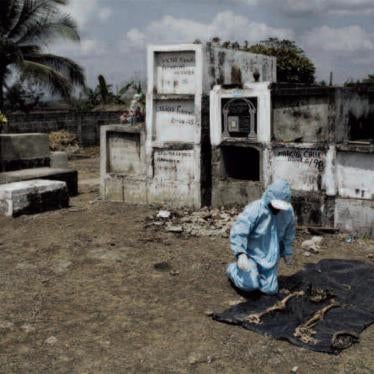Colombian President Alvaro Uribe’s interference with investigations conducted by the Colombian Supreme Court and his repeated attacks on the court itself are a threat to judicial independence, Human Rights Watch said today.
Yesterday, Uribe issued a public statement calling for an investigation into allegations that a Supreme Court justice, Iván Velásquez, had sought to persuade an imprisoned individual to provide testimony implicating the president in an assassination. Uribe stated that he had received a letter from this individual denouncing the justice’s actions.
Uribe also stated that he directly called Justice Velásquez, to ask him about the allegation. Velásquez is the head of the Supreme Court team charged with investigating links between politicians and abusive paramilitary groups.
“Against all odds, Colombia’s Supreme Court has been making unprecedented progress in investigating links between paramilitaries and politicians close to the president,” said José Miguel Vivanco, Americas director at Human Rights Watch. “President Uribe’s phone calls to the judge charged with these highly sensitive investigations amount to political pressure that could intimidate the court and affect the outcome of the cases.”
Dozens of Congressmen from Uribe’s coalition, including the president’s own cousin, Senator Mario Uribe, are currently under investigation by the Supreme Court for their alleged collaboration with drug-running paramilitaries responsible for widespread atrocities. Fourteen Congressmen are already under arrest as a result.
Uribe’s statements come on the heels of a report published by the leading Colombian newsweekly Semana about the Supreme Court’s investigation of phone calls by some of the imprisoned Congressmen, in which they appeared to be plotting to pay off witnesses and public officials and destroy evidence against them.
The Supreme Court has defended Justice Velásquez, and called for an investigation of possible obstruction of justice by the president. Velásquez, who has served for two decades in the judiciary, has vigorously denied any effort to involve Uribe in the investigations, noting that in any case the Congress – not the Supreme Court – is the institution charged with investigating the president.
Newspaper reports suggest that Justice Velásquez’s account of events has been corroborated by a prosecutor who is reported to have witnessed Velásquez’s interview with the imprisoned individual in the course of ongoing investigations. This prosecutor is reported to have stated that President Uribe was never mentioned in the interview.
Human Rights Watch noted that Uribe has a disturbing record of making aggressive statements against the courts and media outlets that are investigating his administration and political cronies.
Earlier this year, when the Supreme Court ruled that the Constitution forbade pardoning the crime of forming paramilitary groups, Uribe railed against the court, accusing it of having an “ideological bias.” Previously he had lashed out against prominent Colombian media when they had revealed allegations that Uribe’s former intelligence chief, Jorge Noguera, had collaborated with paramilitaries.
Just last week, Uribe accused El Nuevo Herald journalist Gonzalo Guillén of seeking to smear him in a book by Virginia Vallejo, the former lover of notorious Medellín drug cartel chief Pablo Escobar. Vallejo asserts in the book that Escobar had introduced her to Uribe. Guillén, who has written about links between the Uribe administration and paramilitaries, and who received serious threats on his life earlier this year, has stated that he had nothing to do with Vallejo’s book or the allegations therein. Because of death threats he received after being criticized by Uribe, Guillén said that he planned to leave Colombia on Saturday.
“In a country like Colombia, where journalists and judges have often been killed because of their investigations, the president should exercise the utmost care to avoid even the appearance of intimidating them or putting them in jeopardy,” said Vivanco.







